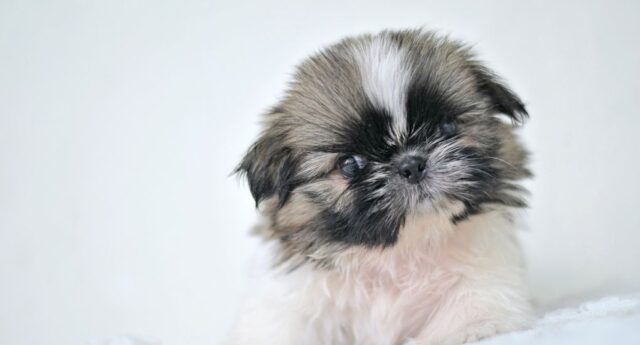
Table of Contents
The Chinese Imperial dog is a very cute and tiny animal.
How tiny, you say? Well, these dogs hardly reach about four and seven pounds!
However, this dog breed strikes controversy in the dog world. Two camps are divided over the name and breed of this specific dog.
The American Kennel Club and the American Shih Tzu Club claim that the Chinese Imperial Dog or Imperial Shih Tzu is just a miniature-sized Shih Tzu.
However, the Chinese Imperial Dog camp claims that this tiny dog breed has a unique Imperial gene, making it a different breed.
They believe that the Chinese Imperial has existed for centuries in China and has been considered a separate breed all these times.
But regardless of what or who you believe, you can't deny the breed is an adorable, joyful dog that fits its purpose perfectly as a companion dog.
This blog will discuss everything you need about the Chinese Imperial Dog breed.
Below, we'll tackle the breed's health care, temperament, grooming needs, and more.
If you're planning to adopt a Chinese Imperial puppy, you better scroll down!
So, without further ado, let's start things off with the Chinese Imperial Dog's history.
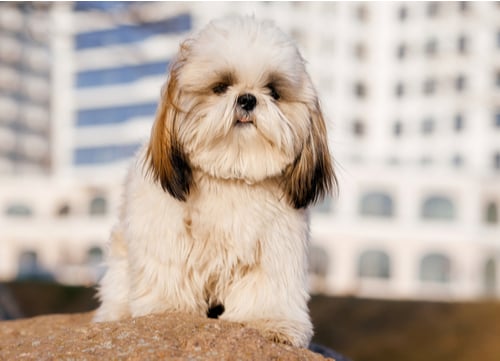
Chinese Imperial Dog History
Chinese Imperial or Imperial Shih Tzus are from the toy dog breed. Toy dogs mean they are smaller than standard-sized dogs.
The Chinese Imperial Dog Club of America believes that the breed has existed for about 2,000 years.
It is believed that these dogs have descended from Tibetan and Chinese herding dogs, and it has existed since the Chinese Tang Dynasty.
A long, long time ago, during ancient times, small-sized companion dogs were treasured as they lived among Chinese nobilities.
Some history books confirm that the Dowager Empress Cixi, who was one of China's last monarchs, was a dog fancier who had many small dogs.
Foreign VIP visitors were also gifted these kinds of small-sized companion dogs, such as the Chinese Imperial dog.
On the other hand, the American Kennel Club (AKC) believes that the breed only dates back to the 1960s.
They said that Chinese Imperials are Shih Tzu dogs that were dwarfed down by breeders, which is unethical and unhealthy for the dog.
And the terms teacup, mini, tiny, or toy started to become popular from the start of 1980 to the 1990s to describe this much smaller Shih Tzu.
To this day, there is still an ongoing debate about whether or not the Chinese Imperial dog is a separate breed.
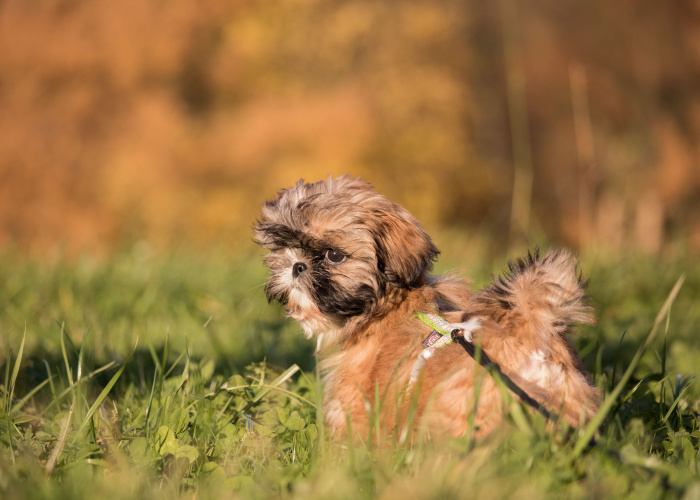
Chinese Imperial Dog Physical Characteristics
As we've discussed above, the Chinese Imperial Dog looks like a miniature version of the Shih Tzu.
They are so small that they can only grow for about 7-8 inches, and they weigh an average of 4-7 pounds.
Their body is compact, and even though they are tiny dogs, they have a well-muscled body.
However, it'll be hard for you to see their body shape due to their fluffy coat, but their body is well proportioned, and they have a well-developed bone structure.
Their legs are short, but their paws are huge for their size.
Their luxurious coat comes in various colors, including black, white, red, and apricot.
Similarly to Shih Tzus, their fur also comes in two varieties: long-haired and short-haired variation. Long-haired Shih Tzus have longer, thick coats than shorter, soft, and silky coats.
Their dense coat gives the Imperial Shih Tzu a teddy bear look. However, denser coat means they are more suitable for cooler climates.
Chinese Imperial Dog Temperament
Are you looking for a small companion dog? Well, the Chinese Imperial Dog might be the one for you.
The Imperial Shih Tzu is a happy, smart, active, and loyal dog.
They love to play and cuddle with their owners. But because they're intelligent, they can have a streak of independence.
And don't be fooled by their size! These little dogs can also be a bit mischievous at times.
These little pups are great companion dogs. They can sense well what their owner's mood is and will react accordingly.
For instance, if you're feeling sad or stressed, a Chinese Imperial Dog will most likely cuddle with you and do everything to make you feel loved.
Living with a Chinese Imperial Dog
These adorable dogs are known as lap dogs. They love to cuddle and just sit on your lap.
But they are also active dogs that love to run around and chase you around the house.
Especially when they are still young, they are curious, energetic, and can be comical at times.
The Chinese Shih Tzu also loves to play and snuggle with children.
Ensure that your pup has plenty of toys to keep them mentally stimulated and active.
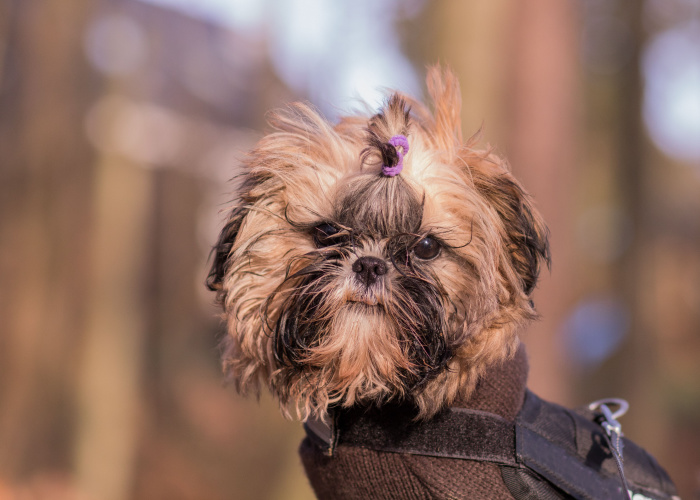
Chinese Imperial Dog Training and Exercise Needs
Now, you might think that because Chinese Imperial Dogs are small, that means they won't need any exercise. You're absolutely wrong!
Even though they are small and very active at home, these cute pups still require their daily walks.
A daily walk is crucial for a dog's health.
When you go on walks in dog parks, it can also be a way of socializing your dogs. But I recommend you to choose a dog park that separates the large and small-sized dogs.
RELATED: How to Introduce Your Dog to a Dog Park: The Complete Guide
It's best to socialize dogs at a young age so that they can be more confident and less stressed. Expose them to new sounds, smells, environments, and more.
Regardless of the dog's size, physical and mental stimulation is essential when it comes to owning a dog.
On the other hand, just like any other dog, training is a must.
Start with the basics, like teaching him to sit, stay, and come to you when being called. Chinese Imperial Dogs are intelligent dogs, which makes them capable of learning other challenging tricks.
Chinese Imperial Dog Health Care
The Chinese Imperial Dog is generally a healthy breed. These toy-sized dogs can live up to 10 to 16 years of age.
Unfortunately, just like any other dog breed, they are prone to some health problems that you should be aware of.
If you plan to adopt a Chinese Imperial Dog, find a reputable breeder who can provide the parents and the puppies' health clearances.
Below, we've gathered a few health problems that the Imperial Shih Tzu dogs are prone to.
Hip Dysplasia
Hip Dysplasia is a hereditary disease wherein the socket of the joint and ball becomes distorted.
If your Chinese Imperial gets diagnosed with hip dysplasia, it’s important to keep their weight within the standard range. Also, engage them in exercises and activities that promote joint therapy.
Vets can also prescribe anti-inflammatory medications, pain relievers, and other supplements to help with this condition.
Prevention is better than cure! That's why it's important for dogs to get their daily exercise and be active.
Patellar Luxation
Patellar Luxation happens when the patella shifts its alignment out of the femur. Symptoms of this condition include skipping and kicking off the leg.
Treatment will depend on the range of the luxation from high to low levels.
Best advised to consult with your vet for proper treatments, therapies, or procedures to help your dog with Patellar Luxation.
Similarly to Hip Dysplasia, Patellar Luxation is also a genetic disorder in dogs.
If your Imperial Shih Tzu has been diagnosed with patellar luxation, it should never be bred anymore, so it will not be able to pass down to their offspring.
Umbilical Hernia
An umbilical hernia is present at birth due to an affliction of abdominal fat or internal organs protruding against the abdominal wall.
Fortunately, small hernias can be resolved when a puppy is six months old. However, large ones will require surgery when the dog is neutered or spayed.
Surgery can also prevent much more severe problems where an intestine loop drops into the hernia, which can be a fatal intestine strangulation.
Allergies
Allergies are one of the most common ailments in dogs. There are food allergies, contact allergies, and inhalant allergies.
Dogs should be checked with the veterinarian for medication or supplements needed for them.
Remember to have your Imperial Shih Tzu regularly checked.
Owners should also ask their most trusted veterinarian what causes the allergy and what foods or activities to avoid.
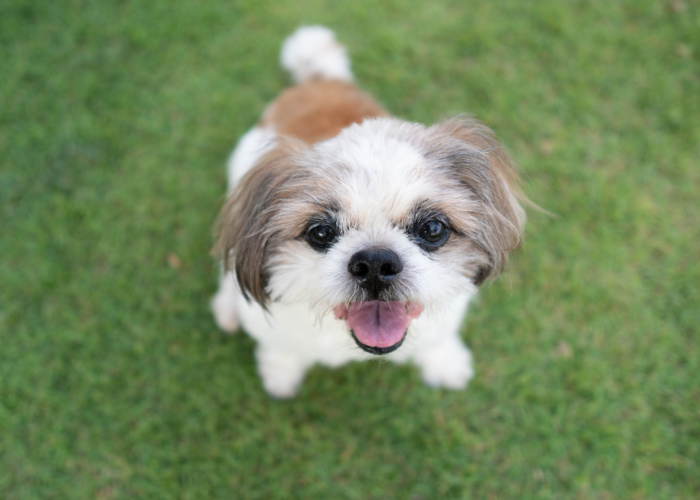
Grooming Needs
Chinese Imperials are cute and adorable little dogs that require care and maintenance to keep their great aesthetics.
They are captivating dogs with a double coat: a thick outer coat and a soft undercoat.
Since their coat makes them fluffy, they are prone to heat exhaustion. If you live in a hot climate, it's best to keep your Chinese Imperial's coats regularly trimmed.
Coat trimming is usually required every 6 to 8 weeks.
For brushing, it's recommended that you brush your Chinese Imperial coats daily to prevent matting and to eliminate dust and other dirt.
Bathing can be done every three to four weeks. Use a special dog shampoo to protect their skin and coat.
Daily tooth brushing is recommended to avoid tartar buildup and remove bacteria lurking inside their mouths. Regular teeth cleaning is important to prevent dental problems.
Keep their nails short by trimming them regularly. When trimming their nails, a good rule is never to let them touch the ground.
RELATED: Nail Neglect: Importance of Dog Nail Trimming
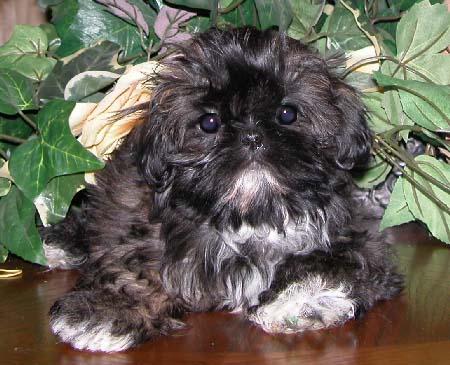
Frequently Asked Questions
How big are Chinese Imperial dogs?
Chinese Imperial Dogs grow no higher than 7 to 8 inches tall, and they weigh an average of 9 pounds.
Caution is needed if you plan to adopt this dog since they are so tiny that they can easily get hurt.
Is A Shih Tzu a Chinese dog?
Shih Tzus are commonly acknowledged as Chinese dogs, but they actually came from Tibet, China's western neighbor.
It is believed that Tibet sent dogs to Chinese royalties as gifts many, many years ago.
What is the difference between Imperial and normal Shih Tzu?
Imperial Shih Tzus are smaller than normal Shih Tzus.
However, according to the AKC, Imperial Shih Tzus are just Shih Tzus bred intentionally to be smaller than the breed standard.
Chinese Imperial Dog Breed Profile Before You Go…
The Chinese Imperial Dog, or the Imperial Shih Tzu, is an adorable toy dog that has plenty of debate surrounding it.
One camp believes that these dogs are a separate and unique breed that has existed for centuries in China, while the other claims that the Chinese Imperial Dogs are just miniature-sized Shih Tzus that were bred unethically.
But no matter what you believe in, you can't deny this breed's cuteness.
These teacup dogs are excellent companion dogs. They are cuddly, playful, and enthusiastic dogs that can be a perfect addition to your family.
If you plan to adopt a Chinese Imperial puppy, you should know that they are best suited in cooler climates.
Even though they can adapt to warm weather, it's still best to keep them in a room with an AC due to their fluffy double coat.
Liked this article? Check out more of our dog breed profile posts below!












